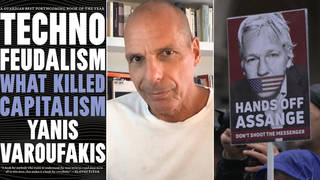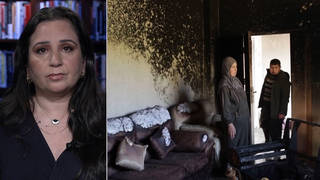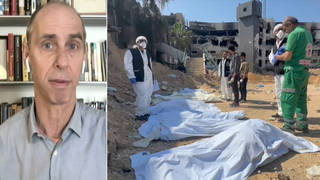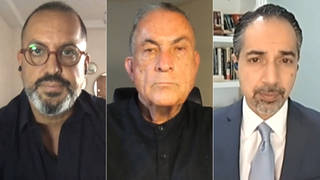
Former field secretary of SNCC, professor Ekwueme Michael Thelwell speaks on the 40th anniversary of the Voting Rights Act at the Grassroots Radio Conference in Northampton, Massachusetts. He discusses today’s struggle around strengthening provisions to the act and the role of grassroots media. [includes rush transcript]
On Saturday, the 40th anniversary of the 1965 Voting Rights Act, Amy Goodman spoke with Ekwueme Michael Thelwell, the Jamaican-born novelist and Professor of Afro American studies at the University of Massachusetts, Amherst. He was also the former field secretary for the Student Nonviolent Coordinating Committee (SNCC). While working for SNCC in Washington DC, Thelwell recruited volunteers for the 1964 Freedom Summer campaign in Mississippi, which sent volunteers into the state to register African-American voters.
Thelwell’s many accomplishments include his publication “Ready for Revolution,” a compilation of the memoirs of Stokely Carmichael, (Kwame Toure) chair of SNCC and honorary prime minister of the Black Panther Party. Thelwell is also the author of the novel, “The Harder They Come.” Amy Goodman interviewed Thelwell at the 10th annual Grassroots Radio Conference, attended by hundreds of media activists from across the country.
- Ekwueme Michael Thelwell, Professor of Afro-American studies at the University of Massachusetts, Amherst. Former Field Secretary of SNCC.
Transcript
AMY GOODMAN: I had the opportunity to speak with Michael Thelwell on the day of the anniversary, August 6, just on Saturday night at a conference in Northampton, Massachusetts. The annual event was attended by hundreds of media activists from across the country, who had come together to celebrate community media. We were at the John M. Green Hall at Smith College. And I asked Ekwueme Michael Thelwell to talk about the state of the media today.
EKWUEME MICHAEL THELWELL: I want to congratulate you personally for the work you are doing because I have been observing the government and media in this country for 40 years. And I have never seen a time where the media, now a corporate monopoly, has been so compromised, so corrupt, so subservient and the general population so victimized as a consequence of that corruption. So the work that you are doing and the people in grassroots media is incrementally much, much more valuable and crucial at this particular time. Because I think that a fundamental social contract of this country , everything that makes this country an entity that you could admire and want to defend, is being challenged as I have never seen it In 40 years. So, what you do is very important.
AMY GOODMAN: Well, it’s especially significant now this weekend with the establishing of a new radio station here —
EKWUEME MICHAEL THELWELL: Precisely.
AMY GOODMAN: — in your area, low power FM and all the media activism that goes on here in Western Massachusetts. As we sit here today, in Atlanta, thousands of people marched today on this 40th anniversary of the Voting Rights Act. Could you talk a little bit — can you go back to that time? Can you talk a little bit about your experience organizing African Americans to vote in the Mississippi Delta? And also you can bring in the experience of Kwame Toure.
EKWUEME MICHAEL THELWELL: You don’t want me to talk about all that, Miss Goodman, because we don’t have time.
AMY GOODMAN: You can call me Amy.
EKWUEME MICHAEL THELWELL: Amy. But what I’ll say is this. We were very active, Carmichael, SNCC, Mississippi Freedom Democratic Party, in fighting for the right to vote, and I particularly worked in Mississippi. That fight took four years, cost many lives and a whole displaced population. People were turned off their land. People were run out of the state. And white American terrorism was manifest every day of our lives in that struggle, so that people fought, died and bled for the right to vote. When the Voting Rights Act was signed, I was working in Washington, D.C. A comrade of mine who was working with the Mississippi Freedom Democratic Party is in the audience, Alan Shipman, and we understood and the movement understood that the Voting Rights Act was signed very reluctantly and over the active protest and resistance of segments of the dominant then Democratic Party, because of its Southern wing.
AMY GOODMAN: Explain that for people who weren’t even born then, but are very interested in this history.
EKWUEME MICHAEL THELWELL: The Democratic Party had a very hybrid and bastard characterization. For the one hand, its Southern arm really ran the country, because in the apartheid South, where 40% of the population, black people, were not allowed to vote, they were still counted in the census. So, the South got representation, as though the black population were in fact citizens. And then only white people were allowed to vote. There was only one party, the Democratic Party, so that the Southern Democrats, the so-called Dixiecrats, had incredible longevity in the Congress, and they were totally overrepresented in the House of Representatives because the black vote was disfranchised.
When L.B.J. signed the Voting Rights Act, he is said to have said, “I have just signed the destruction of the Democratic Party,” which was something we cheered, because we thought that once black people in the South were able to vote, the progressive elements in the Democratic Party, the labor movement throughout the country, and progressives throughout would make an alliance with a more progressive liberal Democratic Party coming out of the South, and the Democratic Party would have a single characteristic. It wouldn’t be divided anymore.
To our distress, what happened was the Dixiecrats, the racists, the segregationists simply migrated wholesale into the Republican Party and since that time, there have only been two Democratic presidents, and both of them from the South. You know, so that the law of unintended consequences, we won a victory by which the whole country suffered, as a consequence of the taking over of the Republican Party by these really renegade, undemocratic, reactionary, backward elements from the Southern Dixiecrats. And they have run the Republican Party ever since.
And the Republican Party has managed to establish a media network, which has really created in this country a virtual reality. I have spent the summer examining the media, and I have been appalled at what I have been seeing.But it’s very clear — they used to tell us that only totalitarian countries rewrote history, and they did it for devious reasons. But I have seen the way the American media can not only rewrite history, but can completely redefine and reconstruct contemporary reality. Do you remember when the late Ronald Reagan died? Now, this — may he rest in peace. But you see, this wasn’t something four or five generations ago. We have been led to understand that you can rewrite history if everybody who experienced that history is dead. So, who can contradict you? But Ronald Reagan’s administration was in the lifetime of everybody living. And yet if you looked at the way the media reported it, you could see no relationship between the administration that we had lived through and the one that they were enshrining in national memory. So, the media is rewriting history every day.
The struggle — before Mrs. Fanny Lou Hamer died, I went to visit her. And she looked at me and tears came into her eyes. She said, “Mike, do you remember how hard we had to struggle, bled and died for the right to vote?” I said, “Yes, Mrs. Hamer, who could forget?” She says, “You know, these young people don’t care anything for that.” This generation, in one generation that struggle had been forgotten almost, and forgotten largely because history isn’t taught properly, but also because there’s still a concentrated effort by the very same people who resisted the broadening of the democratic practices in this country to minimize and reduce minority voting. We saw it in 2000. We saw it in 2004. Rehnquist himself did that before he went to the Supreme Court. So, those forces are still very much alive and more powerful now than they were in 1965, which is something nobody would have wanted to believe, that at the turn of the century, forces we thought were in retreat, that this country had made a turn towards a more rational, a more humane, a more decent and civilized society, could have suffered the kind of setbacks we have seen, which is why the work you do on Democracy Now! and the grassroots radio people and the activists present in this room, although you are now threatened and the values we respect are jeopardized, the work you do is much, much more important now than anything we did then, and the price of failure is inconceivable. You don’t even want to think about it, because the direction that this country is being moved in.
AMY GOODMAN: In Atlanta, tying in to what you are saying, Professor Thelwell, organizers of the Keep the Vote Alive march called for Congress and the President to extend key provisions of the landmark legislation, the Voting Rights Act, and Congress member John Lewis, Georgia, said, “40 years later, we’re still marching for the right to vote. Don’t give up, don’t give in. Keep the faith. Keep your eyes on the prize.”
EKWUEME MICHAEL THELWELL: Absolutely, but it’s important to notice, you know, that what will a Republican — and this isn’t even the same Republican Party. These people are not conservatives. They are right wing radicals. What will that Congress do when it comes time to renew the Voting Rights Act? And it would be important to note also that during the Reagan administration, when another renewal came up, some of the strongest and most cogent and most ideologically driven arguments as to why the Voting Rights Act should be constrained or not renewed came from Mr. Roberts who has been nominated to the Supreme Court now.
AMY GOODMAN: Explain.
EKWUEME MICHAEL THELWELL: Well, he was an adviser in the Justice Department or the White House. He served both places, under Reagan, and these issues came up. And he was to write — it was the Justice Department, and he was to write legal memos to Elliot Smith, the Attorney General, who — I am not sure I got his name right.
AMY GOODMAN: William French Smith.
EKWUEME MICHAEL THELWELL: William French Smith. Thank you. And so, some of those memorandums have come to light. And they were all ideologically driven arguments, couched in legal terms as to why it would be appropriate, good, and in the interest of the country or maybe only the administration, to in fact constrain the Voting Rights Act, not to extend it to certain territory — not to extend it to certain areas, and to restrict it. And those were his first contributions, I guess, to the national political discourse. Whether he will be given an opportunity to make further contributions on the high court is something that we all look at with considerable interest and apprehension.
AMY GOODMAN: Professor Thelwell, I wanted to ask what it was like for you to come from a predominantly black country, and also in your writing about Kwame Toure, Stokely Carmichael, the same, from the Caribbean, although his experience may have been different from yours, coming to this country, a predominantly white country, and what was it like for you in the 1960s, your experience as you were fighting here for African Americans to get the right to vote, coming from a very different place?
EKWUEME MICHAEL THELWELL: Well, what I am about to say is almost certain to be misunderstood, because my country was predominantly black and with social problems, but on the question of race, relatively civilized. I didn’t really become black until I set foot in this country. In Jamaica, I was simply a promising, very smart, very articulate young man. I got off the plane at La Guardia, and I became a Negro. I went to Howard University, the best thing I ever did. It was a black school. 30% of the population was from the Caribbean, another 10% was from Anglophone Africa and the rest were from the African American community, from Georgia, Mississippi, Louisiana, from Detroit, from New York. So, it was an incredible enclave in Washington of young black people and an institution with a whole black legacy and heritage. So that it was a perfect place to enter into the discourse and sensibility of the black world, of a self-conscious black world, in a way that we didn’t really have to do in Jamaica up until the time that I left it. I mean, I had never been refused food in a restaurant. That would happen to me in Baltimore. I had never been arrested for anything. That would happen to me in this country, though always in the civil rights movement, never for petty crime. And I have to say, my education as a black man began when I came — I went to Howard University and met people like James Baldwin, Bayard Rustin, Martin Luther King, Malcolm X, etc., etc., especially because of activism in the movement.
AMY GOODMAN: Professor Ekwueme Michael Thelwell, the Jamaican-born novelist and Professor of Afro-American Studies at the University of Massachusetts, Amherst. He was also Field Secretary for the Student Non-Violent Coordinating Committee, SNCC. He worked with them in Washington D.C., organizing recruits for the 1964 Freedom Summer campaign in Mississippi where he also spent a good amount of time organizing African American voters. Among Professor Thelwell’s works are Ready for Revolution, which he wrote with Stokely Carmichael (Kwame Toure), helping Kwame Toure in his last days put together his memoir, Kwame Toure, leader of the Black Panther Party. Also his novel, Professor Thelwell’s novel is called The Harder They Come. I interviewed him at the Grassroots Radio Conference, the tenth annual conference. This year it was held in Northampton, Massachusetts. We’ll put the full mp3 of the entire event on our website at DemocracyNow.Org. Among those we talked to, Martín Espada, the renowned poet, Frances Crowe, long-time activist, as well as Juanita Nelson, a war tax resistor more author than a half century. Thurston Moore also performed, one of the founders of Sonic Youth. That will all be on the mp3 at DemocracyNow.org.












Media Options